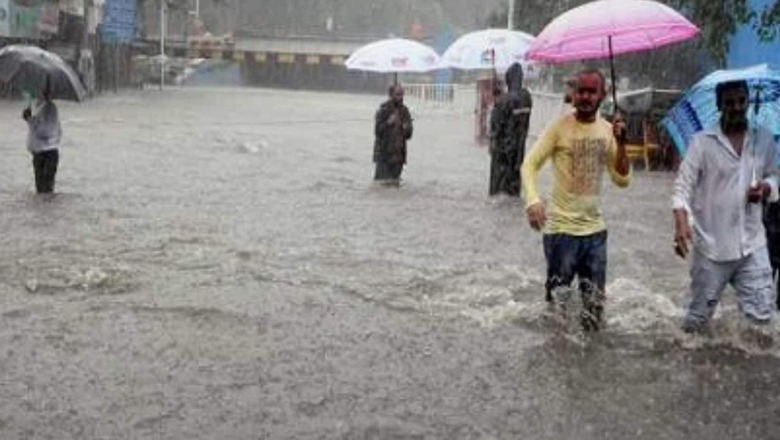
views
As incessant rains continued to pound the northeast, Meghalaya’s Mawsynram, the wettest place in India, gauged an enormous 1003.6 mm of precipitation in 24 hours ending 8:30 am on Friday, the highest ever on a day in June, while neighbouring Cherrapunji received 972 mm of rainfall, the IMD said. The rainfall in Cherrapunji, also one of the wettest places in the world and at an aerial distance of 10 km from Mawsynram, was the highest in June since 1995 and the third highest in 122 years. Mawsynram had gauged 710.6 mm of rainfall in 24 hours ending 8:30 am Wednesday. Before Friday’s record rainfall, it had received 944.7 mm of precipitation on June 7, 1966, the India Meteorological Department (IMD) data showed.
“Mawsynram is at present the wettest place in India, with an average annual rainfall of 11802.4 mm (average of the 1974-2022 period). Cherrapunji receives 11359.4 mm of rainfall in a year (average of the 1971-2020 period),” Sunit Das, Scientist E at IMD’s regional centre in Guwahati, said. One of the wettest places in the world, Cherrapunji has recorded more than 800 mm of precipitation on a June day on nine occasions since the IMD started keeping records in 1901.
Till Friday, Cherrapunji has received a total of 4081.3 mm rainfall this month. In 24 hours ending 8:30 am on Wednesday, the town nestled in the East Khasi Hills gauged a copious 811.2 mm of rainfall. On June 16, 1995, Cherrapunji logged 1563.3 mm of rainfall. A day before, on June 15, 1995, it received 930 mm of precipitation. The hill station reported 973.8 mm of precipitation on June 5, 1956.
“It doesn’t always rain like this. 50-60 cm is normal once or twice every year. But 80 cm and above is certainly not usual,” Das told PTI. “A trough has been persisting over the region for some days and southwesterly winds have been continuously bringing a lot of moisture from the Bay of Bengal. These winds smash against the cliffs of the Khasi hills and give rainfall,” he said.
Cherrapunji recorded 673.6 mm of rainfall on Thursday, 811.6 mm on Wednesday, 62.6 mm on Tuesday, 293 mm on Monday and 354 mm on Sunday. The spell of extreme rainfall is likely to continue for one or two days. Thereafter, the intensity will decrease, Das said. The IMD has issued a red alert, warning of very heavy to extremely heavy rainfall in Meghalaya and Assam in the next two days.
“A trough at mean sea level runs from northwest Uttar Pradesh to Manipur across Bihar, sub-Himalayan West Bengal and Sikkim and Assam. Moisture incursion is very likely to continue due to strong lower-level southerly/southwesterly winds from the Bay of Bengal during June 17-20,” it said in a special bulletin. “Under its influence, widespread rainfall accompanied with thunderstorms/lightning/ heavy to very heavy with extremely heavy rainfall at isolated places is very likely to continue over northeastern states during June 17-20 and decrease in rainfall intensity thereafter,” the bulletin read. Overall, the northeast and east India has received 220.3 mm of rainfall, 39 per cent more than normal, since June 1 when the monsoon season starts.
Meghalaya has gauged 865.7 mm of rainfall, 153 per cent more than normal, since June 1. Arunachal Pradesh has recorded 253.1 mm of rainfall, 22 per cent more than normal, while Assam has logged 372.9 mm of rainfall, an excess of 79 per cent. However, not all states in the region have seen good rainfall. Manipur, Mizoram and Tripura have reported a rainfall deficiency of 50 per cent, 46 per cent and 38 per cent.
Read all the Latest News , Breaking News , watch Top Videos and Live TV here.




















Comments
0 comment